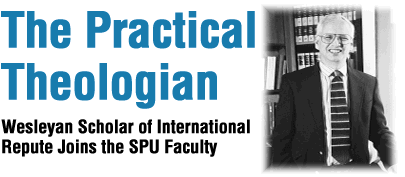
Though some might think him entitled, Randy Maddox exhibits no airs. Certainly he has his students and a teen-aged son and daughter to keep him grounded, but it's more than that. Considered one of the top Wesleyan scholars in the world, Maddox wears that mantle more like a lab coat than a vestment. His lifelong search for the John Wesley of flesh and gristle has at times subsumed the significant scholarly research he has conducted into Wesleyan thought and practice.
This fall, Maddox the practical theologian moves his office from the University of Sioux Falls, where he has taught religion and philosophy for the past 16 years, into the Department of Religion at Seattle Pacific University. He has been named to the Paul T. Walls Chair of Wesleyan Theology, an appointment President Philip Eaton hails as a clear commitment by the University to the highest level of academic attainment.
"That a man of international reputation such as Dr. Maddox chose to join our faculty indicates SPU's stature within the scholarly community," says Eaton. "His interpretation of the Wesleyan tradition in contemporary terms adds deep substance to our commitment to our Wesleyan heritage."
Rob Wall, professor of biblical studies and biblical ethics, shares Eaton's delight. "As soon as the announcement was made, SPU's visibility and credibility rose. To be accepted as a top-flight university, we need to make more of these hires in every discipline."
Les Steele, professor of Christian ministries, thinks SPU has gained "an exceptional teacher" and "a substantial Christian human being." Maddox, says Steele, truly enjoys undergraduate students, has earned the esteem of his colleagues, and has through his many publications and speaking engagements already found an audience among pastors in the Seattle area.
Perhaps his best-known volume, Responsible Grace: John Wesley's Practical Theology (Kingswood Books, 1994), is widely read and considered one of the most important studies on the subject.
Matt Whitehead, pastor of Lakeview Free Methodist Church and a member of the SPU Board of Trustees, was at a local pastors breakfast where Maddox spoke about John Wesley. "Randy Maddox has much to teach us and, because of his expertise, he'll help the University be seen by its constituencies and the city of Seattle as an institution of educational accomplishment."
The man at the epicenter of this excitement is a graduate of Northwest Nazarene College. He pursued graduate work at Nazarene Theological Seminary and earned a doctorate in theological studies from Emory University.
While still in the master's degree program at seminary, Maddox taught introductory and exegesis courses in Greek and Hebrew. As a doctoral student, he team-taught a course on the theology of the church and sacraments for Candler School of Theology at Emory. It was but the first blush of a distinguished teaching career.
Maddox's classes have covered church history, philosophy, ethics, theology, Protestant fundamentalism, Christianity and women, and the doctrine of the Holy Spirit. In the spirit of true Wesleyan ecumenism, he has taught eschatology to Lutheran clergy and United Methodist studies at a Baptist seminary. His ministerial credentials, first issued by the Church of the Nazarene, have since been transferred to the United Methodist Church.
"Wesley's goal was to recover the balance of Christian tradition," stresses Maddox, "and a balance not only between conservative and liberal, or Protestant and Catholic, but between the Eastern and Western Christian traditions as well."
Maddox is likewise eager to contribute to the academic balance he believes will be inherent in Seattle Pacific's move to a Common Curriculum. "It will be a model for other Christian institutions. We must not become compartmentalized thinkers. Some of the most basic questions people ask cross the disciplines."
In the final analysis, Maddox believes that a Wesleyan based institution like SPU provides its students with certain unique advantages. He says its programs and professors purposefully integrate professional training with training for a Christian mind and life; it welcomes ecumenical openness within a commitment to the core beliefs and vitality of Christian faith; and it pushes for bringing all areas of the curriculum into an ongoing dialog with the Christian world view.
"There aren't a whole lot of people out there who are both scholars and significant thinkers in the area of the relationship between Wesleyan-ism and higher education," says Professor of English Susan Gallagher. "Randy Maddox is a real find."
![]()

| Please read our
disclaimer.
Send any questions, comments or correspondence about Response to
jgilnett@spu.edu or call 206-281-2051. Copyright © 1999 University Communications,Seattle Pacific University.
Seattle Pacific University |